Become a Project Manager
Average £50k+ salary for a Project Manager Get started in project managementBook the call that will change your life now! It only takes 30 seconds
Step 1: Pick the date and time that best suits you.
Step 2: Enter your details and click confirm.
Step 3: We’ll call you at your chosen date and time to see if you qualify.
Want to speak sooner? Call us on 0203 758 9324
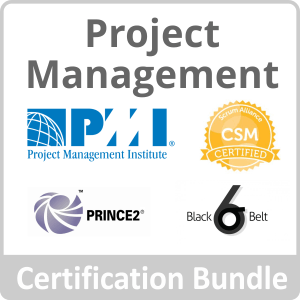
The IT Career Swap Process
Step 1: Consultation
Unsure what course is right for you? We will walk you through what the options are and how you can benefit by starting it. The consultation is free of charge and we will find the perfect course for your needs.
Step 2 : Online Studying
All of your training is delivered online and you will have 24/7 access to the course content for one year, giving you more than enough time to study at your own pace around any previous commitments you may have. The courses will give you an extensive collection of instructor-led videos and other learning resources via our online learning platform.
Step 3: Quizzes & Exam Simulators
IT Career Swap’s custom practice exams prepare you for your exams differently and more effectively than the traditional exam preps on the market. You will have practice quizzes after each module to ensure you are confident on the topic you have completed before proceeding. This will allow you to gauge your effectiveness before moving to the next module in your course. IT Career Swap courses also include practice exams designed to replicate and mirror the environment in the testing center. These exams are on average 100 questions to ensure you are 100% prepared before taking your certification exam.
Step 4 : Guaranteed Interviews
Upon completion of all the online courses and exams we will re-model your CV and start to find you interviews with our local partners in your area. On average we secure 3 interviews per student on completion of the course
The main difference between us and other IT training companies is that we have over 5,000 employer partnerships in operation so we can gain you interviews all over the country with a number of different companies.
What’s Included
Project Management Professional PMP - 6th Edition
Course Content
Getting Certified to take the Examination
Learning objectives – Understanding prerequisites for applying to take the exam and the application process.
Techniques for Preparing for and Taking the Examination
Learning objectives – Understanding how the exam is structured, as well as tips and tricks for exam preparation and post exam continuing education requirements to maintain the certification are also reviewed.
Project Management Framework
Learning objectives – Understanding of how the PMBOK is structured, general project management concepts, project management roles and responsibilities, and leadership skills required to be a successful project manager.
Project Integration Management
Learning objectives – Understanding the Project Integration Management processes, and their associated Inputs, Tools and Techniques, and Outputs, as well as key concepts, trends and emerging practices, and tailoring considerations in project integration management.
Project Scope Management
Learning objectives – Understanding the Project Scope Management processes, and their associated Inputs, Tools and Techniques, and Outputs, as well as key concepts, trends and emerging practices, and tailoring considerations in project scope management.
Project Schedule Management
Learning objectives – Understanding the Project Schedule Management processes, and their associated Inputs, Tools and Techniques, and Outputs, as well as key concepts, trends and emerging practices, and tailoring considerations in project schedule management.
Project Cost Management
Learning objectives – Understanding the Project Cost Management processes, and their associated Inputs, Tools and Techniques, and Outputs, as well as key concepts, trends and emerging practices, and tailoring considerations in project cost management.
Project Quality Management
Learning objectives – Understanding the Project Quality Management processes, and their associated Inputs, Tools and Techniques, and Outputs, as well as key concepts, trends and emerging practices, and tailoring considerations in project quality management.
Project Resource Management
Learning objectives – Understanding the Project Resource Management processes, and their associated Inputs, Tools and Techniques, and Outputs, as well as key concepts, trends and emerging practices, and tailoring considerations in project resource management.
Project Communications Management
Learning objectives – Understanding the Project Communications Management processes, and their associated Inputs, Tools and Techniques, and Outputs, as well as key concepts, trends and emerging practices, and tailoring considerations in project communications management.
Project Risk Management
Learning objectives – Understanding the Project Risk Management processes, and their associated Inputs, Tools and Techniques, and Outputs, as well as key concepts, trends and emerging practices, and tailoring considerations in project risk management.
Project Procurement Management
Learning objectives – Understanding the Project Procurement Management processes, and their associated Inputs, Tools and Techniques, and Outputs, as well as key concepts, trends and emerging practices, and tailoring considerations in project procurement management.
Project Stakeholder Management
Learning objectives – Understanding the Project Stakeholder Management processes, and their associated Inputs, Tools and Techniques, and Outputs, as well as key concepts, trends and emerging practices, and tailoring considerations in project stakeholder management.
PMI'S Risk Management Professional (PMI-RMP)
- MODULE 1 – Introduction
- 1.1 Introduction
- 1.2 Overview Part 1
- 1.3 Overview Part 2
- 1.4 Overview Part 3
- 1.5 Overview Part 4
- 1.6 Overview Part 5
MODULE 2 – Risk Management Concepts
- 2.1 Risk Definition And Project Risk Management Part 1
- 2.2 Risk Definition And Project Risk Management Part 2
- 2.3 Critical Success Factors For Project Risk Management
- 2.4 Overall And Individual Risks, Roles And Responsibilities
MODULE 3 – Risk Management Environment
- 3.1 Organizational Risk Attitudes
- 3.2 Organizational Structures
- 3.3 Stakeholder Identification And Analysis
- 3.4 Stakeholder Risk Tolerances And Risk Attitudes
MODULE 4 – Project Definition
- 4.1 Defining The Project And Project Management Plan
- 4.2 Scope Management Part 1
- 4.3 Scope Management Part 2
- 4.4 Scope ManagementPart 3
- 4.5 Schedule Management Part 1
- 4.6 Schedule Management Part 2
- 4.7 Schedule ManagementPart 3
- 4.8 Cost Management Part 1
- 4.9 Cost Management Part 2
- 4.10 Quality Management
MODULE 5 – Risk Management Planning
- 5.1 Risk Management Planning
- 5.2 Critical Success Factors
MODULE 6 – Risk Identification
- 6.1 Risk Identification
- 6.2 Project Scope Risk
- 6.3 Project Schedule Risk
- 6.4 Resource Risk
- 6.5 Tools And Techniques Part 1
- 6.6 Tools And Techniques Part 2
- 6.7 Tools And Techniques Part 3
- 6.8 Tools And Techniques Part 4
MODULE 7 – Qualitative Risk Analysis
- 7.1 Qualitative Risk Analysis
- 7.2 Tools And Techniques Part 1
- 7.3 Tools And Techniques Part 2
MODULE 8 – Quantitative Risk Analysis
- 8.1 Quantitative Risk Analysis
- 8.2 Tools And Techniques Part 1
- 8.3 Tools And Techniques Part 2
- 8.4 Tools And Techniques Part 3
MODULE 9 – Risk Response Planning
- 9.1 Risk Response Planning
- 9.2 Risk Responses
- 9.3 Negative And Positive Risk Responses
- 9.4 Tools And Techniques Part 1
- 9.5 Tools And Techniques Part 2
- 9.6 Results
MODULE 10 – Risk Monitoring And Controlling
- 10.1 Risk Monitoring And Controlling
- 10.2 Tools And Techniques
- 10.3 Conclusion
Six Sigma Green Belt
- Module 1 Six Sigma And The Organization
- 1.1 Six Sigma Green Belt Course Overview
- 1.2 Six Sigma And The Organization Goals Part 1
- 1.3 Six Sigma And The Organization Goals Part 2
- 1.4 Lean Principles In The Organization
- 1.5 Design For Six Sigma
Module 2 Define Phase Project Identification
- 2.1 Define Phase Project Identification Part 1
- 2.2 Define Phase Project Identification Part 2
- 2.3 Define Phase Project Identification Part 3
Module 3 Define Phase Voice Of The Customer
- 3.1 Define Phase Voice Of The Customer Part 1
- 3.2 Define Phase Voice Of The Customer Part 2
Module 4 Define Phase Project Management Basics
- 4.1 Define Phase Project Management Basics Part 1
- 4.2 Define phase Project Management Basics Part 2
Module 5 Define Phase Management And Planning Tools
- 5.1 Define Phase Management And Planning Tools Part 1
- 5.2 Define Phase Management And Planning Tools Part 2
Module 6 Define Phase Business Results For Projects
- 6.1 Define Phase Business Results For Projects Part 1
- 6.2 Define Phase Business Results For Projects Part2
Module 7 Define Phase Team Dynamics And Define Phase Summary Review Questions
- 7.1 Define Phase Team Dynamics And Review Questions
- 7.2 Define Phase Summary And Review Questions
Module 8 Measure Phase Process Analysis And Documentation
- 8.1 Measure Phase Process Analysis And Documentation
Module 9 Measure Phase Probability And Statistics
- 9.1 Measure Phase Probabilty And Statistics
Module 10 Measure Phase Statistical Distributions
- 10.1 Measure Phase Statistical Distributions
Module 11 Measure Phase Collecting And Summarizing Data
- 11.1 Measure Phase Collecting And Summarizing Data Part 1
- 11.2 Measure Phase Collecting And Summarizing Data Part 2
Module 12 Measure Phase Measurements System Analysis (MSA)
- 12.1 Measure Phase Measurements System Analysis (MSA)
Module 13 Measure Phase Process And Performance Capability And Measure Phase Summary And Review
- 13.1 Measure Phase Process And Performance Capability And Measure Phase Summary And Review
Module 14 Analyze Phase Exploratory Data Analysis And Hypothesis Testing
- 14.1 Analyze Phase Exploratory Data Analysis And Hypothesis Testing Part 1
- 14.2 Analyze Phase Exploratory Data Analysis And Hypothesis Testing Part 2
Module 15 Analyze Phase Process Drivers
- 15.1 Analyze Phase Process Drivers Part 1
- 15.2 Analyze Phase Process Drivers Part 2
- 15.3 Analyze Phase Process Drivers Part 3
Module 16 Improve Phase Design Of Experiment (DOE)
- 16.1 Improve Phase Design Of Experiment (DOE) Part 1
- 16.2 Improve Phase Design Of Experiment (DOE) Part 2
Module 17 Improve Phase Root Cause Analysis
- 17.1 Improve Phase Root Cause Analysis Part 1
- 17.2 Improve Phase Root Cause Analysis Part 2
- 17.3 Improve Phase Root Cause Analysis Demo
Module 18 Improve Phase Lean Tools
- 18.1 Improve Phase Lean Tools Part 1
- 18.2 Improve Phase Lean Tools Part 2
- 18.3 Improve Phase Lean Tools Part 3
- 18.4 Improve Phase Lean Tools Part 4
Module 19 Control Phase Statistical Process Control
- 19.1 Control Phase Statistical Process Contro
Module 20 Control Phase Lean Tools For Process Control
- 20.1 Control Phase Lean Tools For Process Control Part 1
- 20.2 Control Phase Lean Tools For Process Control Part 2
- 20.3 Control Phase Lean Tools For Process Control Part 3
Module 21 Review Exam Prep And Key Concepts
- 21.1 Review Exam Prep Part 1
- 21.2 Review Exam Prep Part 2
- 21.3 Review Exam Prep Part 3
- 21.4 Review Exam Prep Part 4
- 21.5 Review Key Concepts Part 1
- 21.6 Review Key Concepts Part 2
- 21.7 Review Key Concepts Part 3
- 21.8 Review Key Concepts Part 4
- 21.9 Review Exam Flash Cards
- 21.10 Six Sigma Green Belt Outro
Certified Associate in Project Management CAPM - PMI - PMBOK 6th Edition
-
Getting Certified to take the Examination
Learning objectives – Understanding prerequisites for applying to take the exam and the application processTechniques for Preparing for and Taking the Examination
Learning objectives – Understanding how the exam is structured, as well as tips and tricks for exam preparation and post exam continuing education requirements to maintain the certification are also reviewed.Project Management Framework
Learning objectives – Understanding of how the PMBOK is structured, general project management concepts, project management roles and responsibilities, and leadership skills required to be a successful project managerProject Integration Management
Learning objectives – Understanding the Project Integration Management processes, and their associated Inputs, Tools and Techniques, and Outputs, as well as key concepts, trends and emerging practices, and tailoring considerations in project integration managementProject Scope Management
Learning objectives – Understanding the Project Scope Management processes, and their associated Inputs, Tools and Techniques, and Outputs, as well as key concepts, trends and emerging practices, and tailoring considerations in project scope managementProject Schedule Management
Learning objectives – Understanding the Project Schedule Management processes, and their associated Inputs, Tools and Techniques, and Outputs, as well as key concepts, trends and emerging practices, and tailoring considerations in project schedule managementProject Cost Management
Learning objectives – Understanding the Project Cost Management processes, and their associated Inputs, Tools and Techniques, and Outputs, as well as key concepts, trends and emerging practices, and tailoring considerations in project cost managementProject Quality Management
Learning objectives – Understanding the Project Quality Management processes, and their associated Inputs, Tools and Techniques, and Outputs, as well as key concepts, trends and emerging practices, and tailoring considerations in project quality managementProject Resource Management
Learning objectives – Understanding the Project Resource Management processes, and their associated Inputs, Tools and Techniques, and Outputs, as well as key concepts, trends and emerging practices, and tailoring considerations in project resource managementProject Communications Management
Learning objectives – Understanding the Project Communications Management processes, and their associated Inputs, Tools and Techniques, and Outputs, as well as key concepts, trends and emerging practices, and tailoring considerations in project communications managementProject Risk Management
Learning objectives – Understanding the Project Risk Management processes, and their associated Inputs, Tools and Techniques, and Outputs, as well as key concepts, trends and emerging practices, and tailoring considerations in project risk managementProject Procurement Management
Learning objectives – Understanding the Project Procurement Management processes, and their associated Inputs, Tools and Techniques, and Outputs, as well as key concepts, trends and emerging practices, and tailoring considerations in project procurement
managementProject Stakeholder Management
Learning objectives – Understanding the Project Stakeholder Management processes, and their associated Inputs, Tools and Techniques, and Outputs, as well as key concepts, trends and emerging practices, and tailoring considerations in project stakeholder management
Six Sigma Black Belt
- Module 1: Organization Wide Planning and Deployment
- Module 2: Leadership
- Module 3: Organizational Process Measures and Management
- Module 4: Team Management
- Module 5: Define Phase Overview of the Define Phase and the Voice of the Customer
- Module 6: Define Phase Business Case and Project Charter
- Module 7: Define Phase Analytical Tools
- Module 8: Measure Phase Process Analysis and Documentation
- Module 9: Measure Phase Data Collection
- Module 10: Measure Phase Measurement Systems
- Module 11: Measure Phase Basic Statistics
- Module 12: Measure Phase Probability
- Module 13: Measure Phase Process Capability
- Module 14: Analyze Phase Measuring and Modeling Relationships
- Module 15: Analyze Phase Hypothesis Testing
- Module 16: Analyze Phase FEMA and Additional Analysis Methods
- Module 17: Improve Phase Design of Experiments (DOE)
- Module 18: Improve Phase Lean Method
- Module 19: Improve Phase Implementation
- Module 20: Control Phase Statistical Process Control (SPC)
- Module 21: Control Phase Other Controls
- Module 22: Control Phase Maintain Controls and Sustain Improvements
- Module 23: DFSS
- Module 24: Exam Review Prep and Key Concept
-
Progression onto Prince 2 Foundation
Prince2® Foundation + Exam
Course Description
PRINCE2® Foundation is an entry-level project management certification that’s internationally recognised, as well as respected and valued by employers around the world. This course covers the PRINCE2® methodology which is practised in over 50 countries, making it one of the most globally recognised certifications to date. This is the ideal starting point for anyone who is interested in a rewarding career in Project Management.
The PRINCE2® Foundation course is the first of two examination courses that are required to pass in order to become a registered PRINCE2® Practitioner. The Foundation certification is internationally recognised and covers the basic methodology, and terminology, of PRINCE2®. Completing the Foundation course will ensurethe ability to demonstrate an understanding of the PRINCE2® Principles, Themes, Processes and Tailoring. It will also teach the various techniques and roles that are required during a PRINCE2® project. Completion of the PRINCE2® Foundation Course, and passing the certification examination will result in being sufficiently prepared to work within a PRINCE2 environment and as part of a PRINCE2® project management team.
PRINCE2® Foundation Course Content
- Course Introduction
- Module 1 – Structural Overview
- Module 2 – PRINCE2® Overview
- Module 3 – Principles
- Module 4 – Walkthrough
- Module 5 – Organisation
- Module 6 – Starting Up a Project
- Module 7 – Business Case
- Module 8 – Initiating a Project
- Module 9 – Directing a Project
- Module 10 – Progress
- Module 11 – Plans
- Module 12 – Quality
- Module 13 – Risk
- Module 14 – Change
- Module 15 – Controlling a Stage
- Module 16 – Managing Product Delivery
- Module 17 – Managing a Stage Boundary
- Module 18 – Closing a Project
- Module 19 – Exam Preparation Video 1
- Module 19 – Exam Preparation Video 2
- Module 19 – Exam Preparation Video 3
- Module 19 – Exam Preparation Video 4
Further Progression onto your choice of
Prince2® Practitioner
PRINCE2® otherwise known as Projects IN Controlled Environments; is a fully scale-able process driven approach to project management. Although PRINCE2® originated in the UK it has become a world class international product.
The foundation and practitioner course covers all of the following elements:
Introduction to projects and PRINCE2® :
This explains what makes projects different from BAU and introduces the four integrated elements of PRINCE2®
The 7 Principles:
- Continued Business Justification
- Learn from Experience
- Defined Roles and Responsibilities
- Manage by Stages
- Manage by Exception
- Focus on Products
- Tailor to the Project Environment
The 7 Themes:
- Business Case – why are we investing in the project?
- Organization – who do we need to manage the project?
- Quality – what we have to deliver to ensure fit-for-purpose
- Plans – how will we deliver, when & resource requirements
- Risk – managing uncertainty
- Change – understanding implications of changing requirements
- Progress – understanding & controlling where we are against plans
The 7 Processes:
- Process Model – to explain the flow between processes
- Starting up a Project – pre-project preparation
- Directing a Project – decision making and providing resources
- Initiating a Project – developing a full and firm foundation
- Controlling a Stage – day-to-day project manager’s work
- Managing Product Delivery – day-to-day team managers work
- Managing a Stage Boundary – preparing for project board progress decisions
- Closing a Project – tidy close
The 2 Techniques:
- Product Based Planning
- Quality review Technique
Prince2 Agile
This course has 99 course units contained in the following course sections:
Introduction to PRINCE2® Agile
Agile Frameworks
The Hexagon
Focus Areas
Helicopter View
Organization, Governance (DP) and Business Case
Tailoring SU & IP processes
Plans Risk & Quality
Change and Progress
Tailoring CS, MP and SB processes
Tailoring CP process and Summary
The course will help you to: –
Understand the most common agile approaches – SCRUM, Kanban and Lean
Decide whether or not to apply agile to a particular project (and how much!)
Map the PRINCE2 management roles with common agile delivery roles
Understand how to structure a PRINCE2 agile project team, with particular focus on the Project Manager and Team Manager / Delivery Team interface
Understand how to apply the six target / tolerance areas in an agile way
Understand the 5 recommended focus areas for PRINCE2 agile
Learn new agile techniques, such as retrospectives, sprints and
Study the principles and values of PRINCE2 agile
Apply the PRINCE2 themes and processes in an agile way
Course Includes 6 Months Unlimited Online Access to:
7+ Hours of eLearning / Exam practice
99 Multi Media Course Units
11 Interactive Exercises
2 Timed Mock Exams
Expert Tutor Support
Exam Hints and Tips
Tablet Revision App
Resource Library and Glossary
In-House Course Certification
180 Days Course Access
What our students are saying
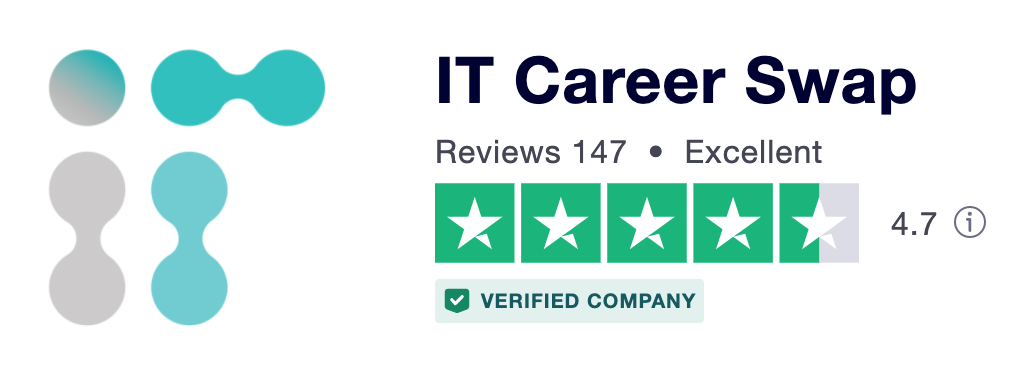
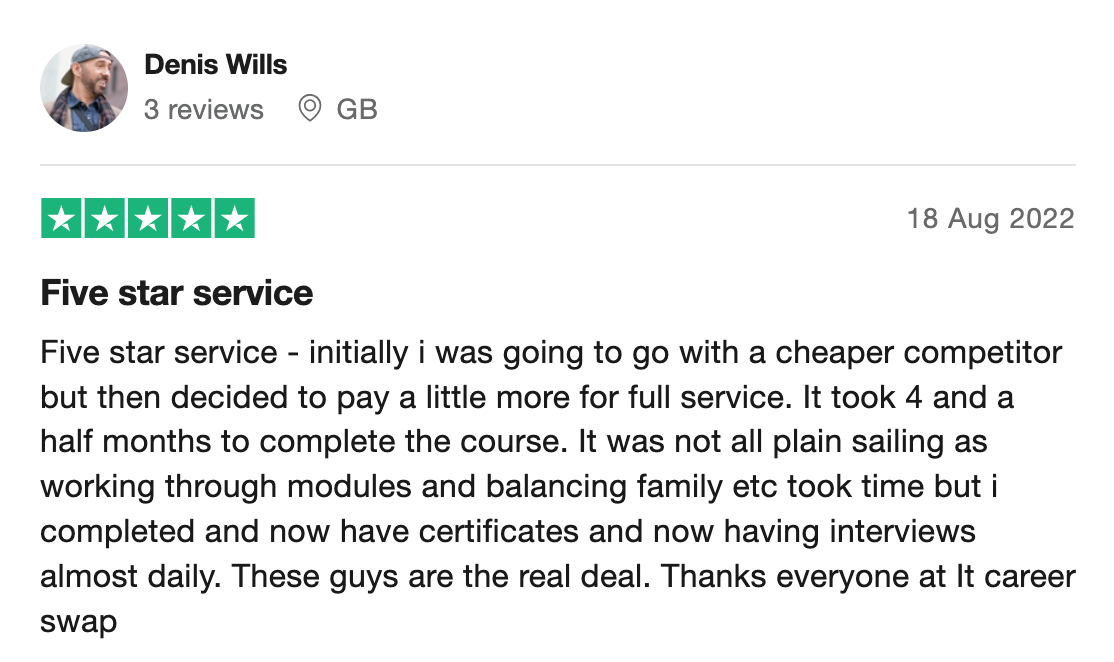
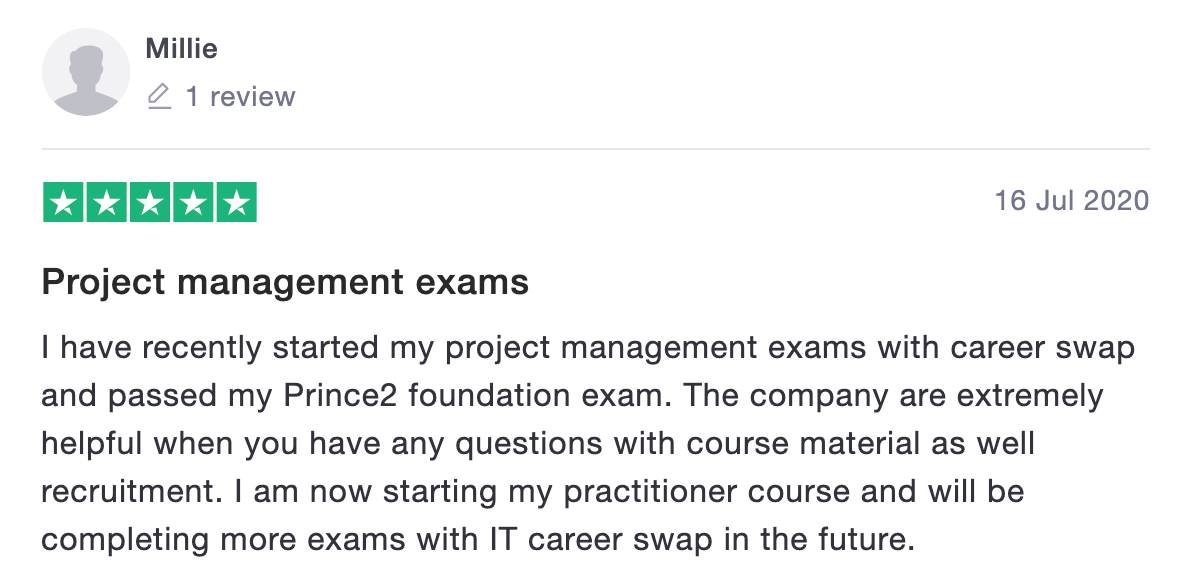

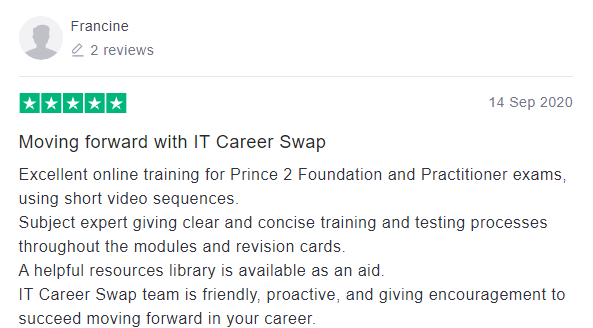

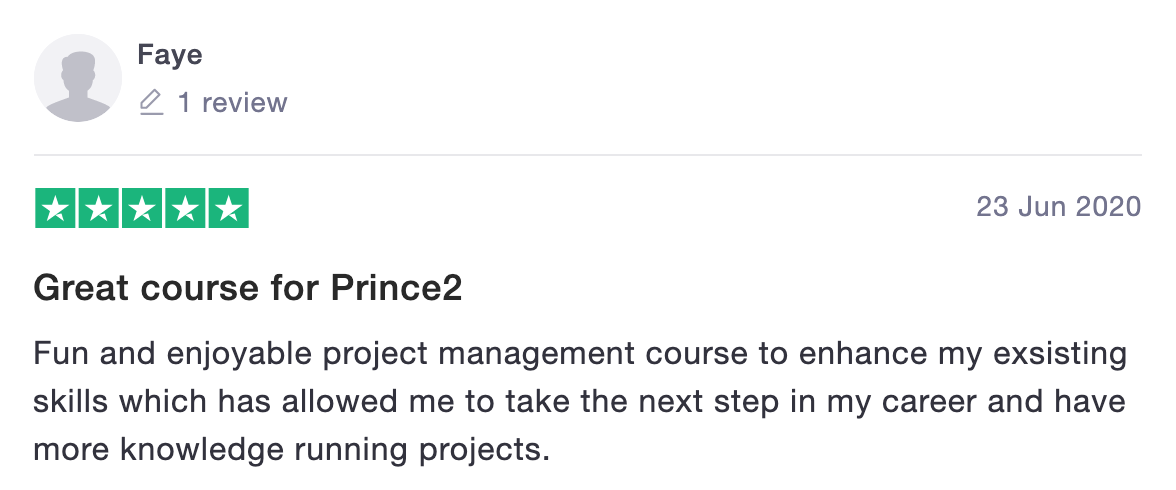
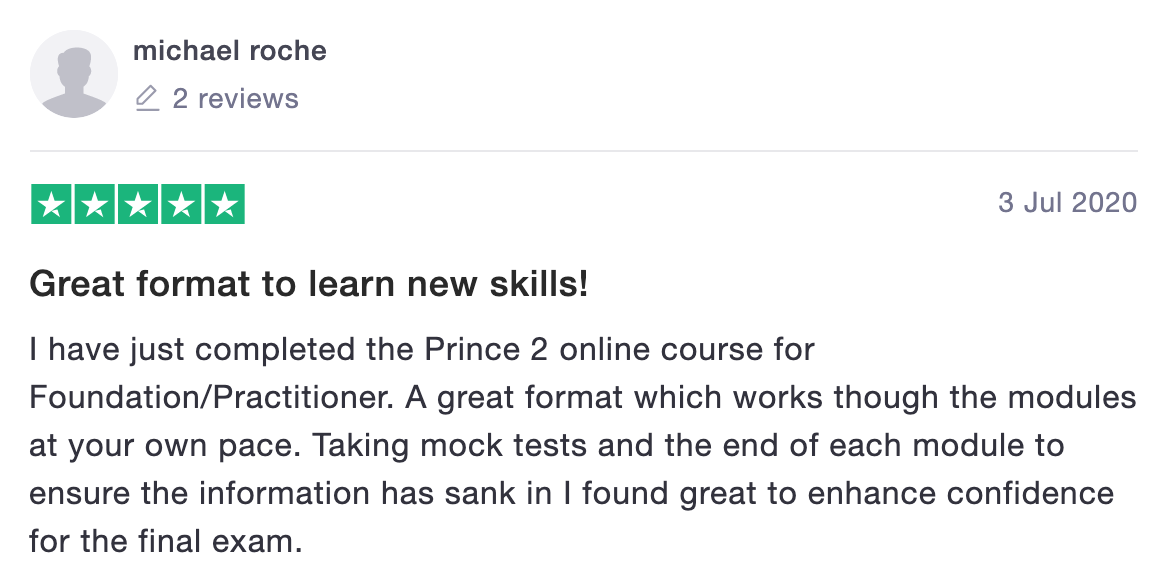
Book the call that will change your life now! It only takes 30 seconds
Step 1: Pick the date and time that best suits you.
Step 2: Enter your details and click confirm.
Step 3: We’ll call you at your chosen date and time to see if you qualify.
Want to speak sooner? Call us on 0203 758 9324

These training courses are provided in partnership with Balance Global

Claim Your FREE Trial
All you have to do is fill in the short form provided and we will be in touch to activate your free trial and send you your login!
The free trial lasts 48 hours so please once you have been handed your login, make sure to make the most of the system.
If you have any questions about the platform please do not hesitate to ask, we’re here to help you make the most of what we provide and to ensure your time with ITCS will be a success just like many students before
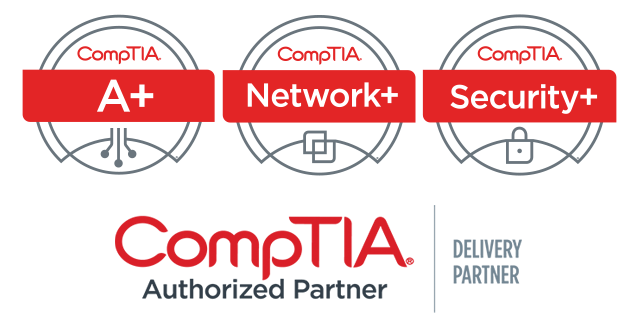
We're Here To Help!
Head Office
Mortimer House Chatsworth Parade
Petts Wood
Kent
BR5 1DE
Hours
Mon - Fri: 8.30am - 6.00pm
Call Us
0203 982 7573
